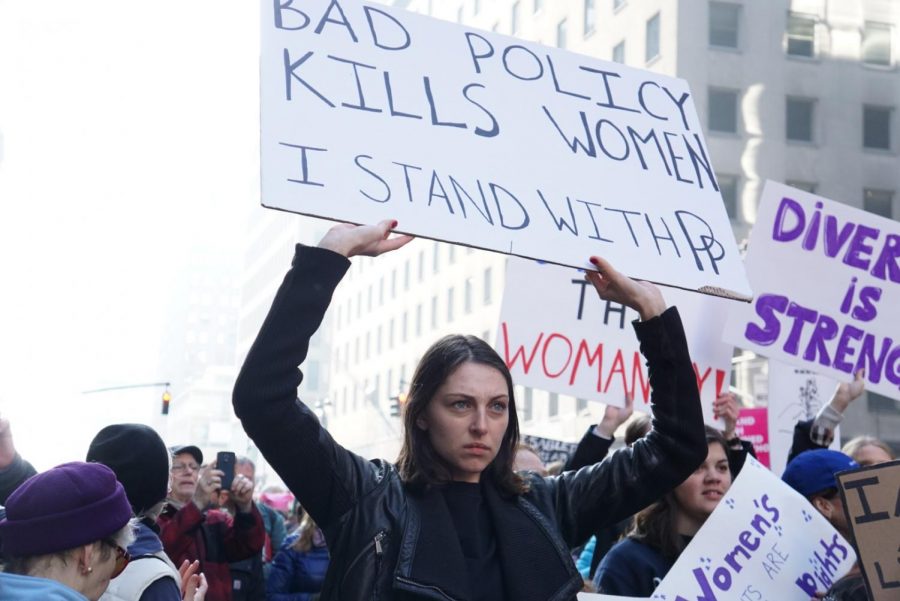Message of the Women’s March Continues to Resonate
How do you defeat a woman with conviction? The answer clearly isn’t with freezing cold and snow. Last Saturday, Jan. 18, thousands of women, myself included, walked from Foley Square to Times Square as part of the annual Women’s March.
This march was the fourth in movement’s history, the first having occurred in 2017 in response to Donald Trump’s presidential inauguration. According to Business Insider, that first Women’s March on Washington holds the record for the largest single-day protest in American history.
Recently, however, the turn-out has not been quite so high. Organizers expected a mere 10,000 participants in this year’s main event in Washington, D.C., according to CNN. This represents a fraction of the half a million protesters that attended the first march in 2017. The dwindling numbers raise questions about the future of the Women’s March.
Perhaps people are staying away after controversies over the organization’s leaders last year. Despite the organization’s claim to fight for equality for all groups, at least two were accused of harboring anti-Semitic views, according to NPR. There have also been complaints that leadership in the Women’s March also lacked the diversity to truly be connected with the experiences of all women.
The organization has worked to erase these concerns. According to the official website of the Women’s March, in September of last year, 17 new board members were appointed to lead the organization. The original founders who had been the main focus of criticisms, Timika Mallory and Linda Sarsour, planned to leave the Women’s March Board in order to focus on other ventures. As the organization states, “The new board consists of leaders from a wide variety of communities, disciplines, ethnicities, religious beliefs, gender identities, and experiences.”
But does this move come too little, too late? Can women who for so long did not see their unique experiences reflected in the highest-ranking members of the movement now feel heard? Is it time to hang up our pink pussy hats and move on to the next feminist movement, one without controversy?
I don’t think so. That shiny and perfect social movement isn’t out there, and I think it is time that we stop looking for it. The political left has become repulsed by imperfection. And, to be clear, I am not reducing issues like anti-Semitism to “imperfections.” Those concerns were valid and needed to be discussed out in the open. It is never a good idea to accept any movement at face value. Context is always important.
However, so is action. The Women’s March in 2019 was the first event of its kind I ever attended. Bundled in thick coats, my friends and I walked together, along with thousands of other women, because we wanted change. We had come of age too early, some of us only 15 when Donald Trump was elected president on a platform of bigotry and racism. The first presidential election I will truly remember resulted in the inauguration of a man who had openly bragged about sexual assault. Too many Americans forgave him for it, excused it and called it “locker room talk,” as if a man in his fifties shouldn’t know better.
The organizers of a social movement are, of course, important. It is their vision that sets the ball in motion. However, after that, it is the people that show up in response that truly represent the cause. Most of the people marching each year probably do not know the names of the founders of the Women’s March. Each of them only needs to know one thing: why they are there.
Perhaps the true issue I see in the Women’s March is the idea that “women” is a category that can ever be narrowed down into particular political agendas and proposed legislation. The women who march certainly do not agree on every issue. There is in-fighting, arguments over what feminism means and who it should include. People who deserve a seat at the table are often forgotten or intentionally left out, especially trans women. There is still quite a long way to go before there is a true consensus — if that is even possible.
But we are each year brought together by a common experience: inequality. We have all experienced pain brought on by a deep-seated societal view that some people are worth less than others. Some, like me, are admittedly lucky. As a white woman, I experience a kind of privilege that so many others do not. Women of color, queer women, and trans women all experience a different kind of oppression and hate, and I cannot speak to their experiences or claim them as my own. But each one of us knows the feeling of being left out of the conversation, out of the room.
Last Thursday, Janaya Khan, a co-founder of Black Lives Matter—Canada, spoke at Fordham Law School about their experience as a black, non-binary activist. The words that resonated with me most deeply were about accepting imperfect allies in the fight for social justice. “It’s an ugly thing when people and places and institutions do good and do harm. But that’s every single one of us…and that’s every single one of our movements,” she said.
The Women’s March will never be perfect. We should criticize this movement when it fails, but we should also recognize the good it has done. The Congress Americans elected in 2018 has more women of color than ever before, and the Women’s March and the activism it inspired has a lot to do with that victory. This is a movement that was able to inspire real change, even while being flawed.
Last Saturday, I saw women in their seventies walking with their friends and little girls lifted up onto their fathers’ shoulders. I saw women fighting for their freedom to choose, for equal pay and for environmentalism. I definitely didn’t see anyone perfect. But that’s not really what being a woman, what fighting for social equality, has ever really been about.
Abbey Delk, FCRH ’22, is an English major from Wheeling, West Virginia.

Abbey Delk is a junior from Wheeling, West Virginia, double majoring in English and journalism and minoring in film & television. Her career at the...










































































































































































































